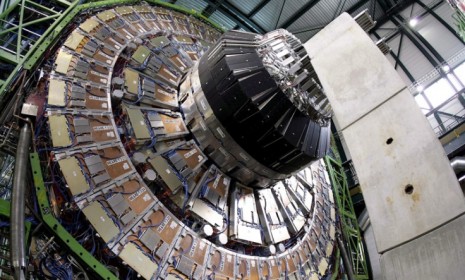The Large Hadron Collider: A time machine?
A new theory suggests the Big Bang machine could be used to send a special kind of particle back in time

A free daily email with the biggest news stories of the day – and the best features from TheWeek.com
You are now subscribed
Your newsletter sign-up was successful
The Large Hadron Collider (LHC) was built to replicate the conditions at the Big Bang, and answer humanity's most basic questions — what are we made of and how did we come to exist? Scientists are still working on that, but have stumbled across something that promises to be even more exciting: The possibility of time travel. Here, an instant guide:
What is the Large Hadron Collider, again?
It's a 17-mile-long particle accelerator built deep underground in Geneva, Switzerland. Scientists hope to use it to discover the Higgs boson, or the "God particle." This mysterious subatomic particle is the piece of the atom that supposedly endows all other bits of matter with mass. If scientists are able to study the Higgs boson, they may discover how matter was produced — in other words, the secret of our existence.
The Week
Escape your echo chamber. Get the facts behind the news, plus analysis from multiple perspectives.

Sign up for The Week's Free Newsletters
From our morning news briefing to a weekly Good News Newsletter, get the best of The Week delivered directly to your inbox.
From our morning news briefing to a weekly Good News Newsletter, get the best of The Week delivered directly to your inbox.
So how could it be used for time travel?
Here's where it gets complicated. If the LHC does manage to produce a Higgs boson, some theorize it will also create a particle known as the Higgs singlet. The singlet, the theory goes, would be able to travel in and out of the hidden fifth dimension and pop out at any point along the space-time continuum.
Wait, fifth dimension? How many dimensions are there?
According to M-theory, or the so-called "theory of everything," there are as many as 11 dimensions, of which our universe only uses four. But the Higgs singlet, if it exists, is theoretically not restrained by the basic laws of physics that govern our universe.
A free daily email with the biggest news stories of the day – and the best features from TheWeek.com
Is it time to break out the DeLorean?
No. According to this theory, it will never be possible for a man (or a 1980s sports car) to travel through time. And besides, the LHC hasn't even located the Higgs boson yet, let alone the Higgs singlet. But, "if scientists could control the production of Higgs singlets," says physicist Tom Weiler of Vanderbilt University, "they might be able to send messages to the past or future."
Haven't people had time travel theories about the LHC before?
Yes. You may remember the development of the LHC was plagued with near-constant malfunctions and long delays. Two physicists came up with the theory in October 2009 that the Higgs boson is "so abhorrent to nature that its creation would ripple backward through time and stop the collider before it could make one." No less a figure than God, said the scientists, is preventing us from discovering the elusive particle.
That sounds far-fetched. They got the LHC working eventually, didn't they?
They did. But even though the LHC is now up and running, it still hasn't found a Higgs boson. And God does move in mysterious ways...
Sources: Discovery (2), New York Times, DVICE, Science Blogs, Seattle Post-Intelligencer
-
 Why the Bangladesh election is one to watch
Why the Bangladesh election is one to watchThe Explainer Opposition party has claimed the void left by Sheikh Hasina’s Awami League but Islamist party could yet have a say
-
 The world’s most romantic hotels
The world’s most romantic hotelsThe Week Recommends Treetop hideaways, secluded villas and a woodland cabin – perfect settings for Valentine’s Day
-
 Democrats push for ICE accountability
Democrats push for ICE accountabilityFeature U.S. citizens shot and violently detained by immigration agents testify at Capitol Hill hearing